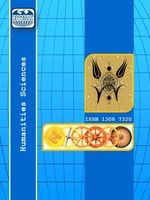İKİNCİ DÜNYA SAVAŞI DÖNEMİ (1939-1945) TÜRK SİYASETİNİN KÖŞE YAZILARI ÜZERİNDEN İNŞASI: CUMHURİYET GAZETESİ ÖRNEĞİ
İkinci Dünya Savaşı Dönemi Türkiye'sinde basın siyasi iktidarın yoğun denetimi altında kalmış, mebus gazeteciler, hukuki düzenlemeler hatta talimatlar yolu ile taraf devletlere karşı denge siyasetinin aracı haline getirilmiştir. Öte yandan mihver ve ittifak devletleri ise kimi zaman kendi taraflarında savaşa girmeye ikna etmek, kimi zaman da propaganda yapma ve yaptırma amacı ile basın üzerinde yoğun baskı uygulamışlardır. Atatürk'ün kurdurduğu bir gazete olarak, ölümünün hemen ertesinde lider değişiminin ve patlak veren savaşın etkisinin en yoğun hissedildiği Cumhuriyet Gazetesi ise farklı görüşler taşıyan yazarlara sahip dönemin en yüksek tirajlı gazetelerinden biridir. Bu noktada araştırmanın amacı, İkinci Dünya Savaşı Türkiye'sinde iktidarın iç siyasetle ilgili olarak âolumsuz yorum yapılmaması talimatıâna; dış siyasetle ilgili olarak ise uluslararası ilişkilerde yürüttüğü âDenge Siyasetiâne ilişkin gazetecilerin/köşe yazarlarının yaklaşımlarının keşfedilmesidir. Bu amaçla, Cumhuriyet Gazetesi'nde 1938-1946 yılları arasında yayınlanmış toplam 11,078 köşe yazısı ve 10,434 köşe yazısı başlığı içerik analizi yöntemi ile incelenmiştir. Araştırma sonucunda, diğer sınıflandırma ölçütlerine göre, dış politika ilgili yorumsuz başlıkların en yüksek, iç politika ile ilgili negatif başlıkların ise en düşük orana sahip olduğu dolayısı ile gazetecilerin/köşe yazarlarının yaklaşımının iktidarın iç ve dış siyasetle ilgili yaklaşımına uygun olduğu belirlenmiştir.
Anahtar Kelimeler:
İkinci Dünya Savaşı, Türk Basını, Propaganda, Cumhuriyet Gazetesi, ,
CONSTRUCTION OF TURKISH POLITICS IN THE SECOND WORLD WAR ERA (1939-1945) THROUGH COLUMNS: THE CASE OF CUMHURIYET (REPUBLIC) NEWSPAPER
The press was under intense supervision of the government in Turkey during the World War II Era, as journalist members of parliament had become the instruments of the politics of balance against belligerent powers through legal regulations and even instructions. On the other hand, the Axis Powers and the Allies exercised intensive pressure over the press either to persuade Turkey to join the war on their side or to make propaganda. Cumhuriyet Newspaper, founded upon Atatürk's order, is the paper on which the effects of the government changeover and the war erupted following the death of Atatürk were felt profoundly. It was one of the newspapers of the period with the highest circulation and it had columnists with contrasting views. The aim of this study is to explore the approaches of journalists/columnists regarding the directive of âavoiding criticismâ about internal politics and regarding the politics of balance, which constituted the main axis of Turkish foreign policy during the period. To this end, a total of 11,078 columns and 10,434 titles published in Cumhuriyet between 1938 and 1946 were examined using the content analysis method. It was concluded at the end of the study that while neutral titles on foreign politics had the highest rate, negative titles on domestic politics had the lowest rate; which indicates that the stances taken by journalists/columnists in the period were in line with the approach of the government on domestic and foreign politics.
Keywords:
Second World War, Turkish Press, Propaganda, Cumhuriyet Newspaper, , ,
- Başlangıç: 2009
- Yayıncı: E-Journal of New World Sciences Academy
Sayıdaki Diğer Makaleler
Ninnilerde Dile Getirilen Temaların Bilimsel Gerçekliği Var mıdır?
SHAKESPEARE`İN OTHELLO`SU: DOĞU İLE BATI ARARASINDAKİ ÇATIŞMANIN BİR TEMSİLİ
Alpaslan TOKER, Srebran Dizdar, Melih Karakuzu
STUDENTS' BELIEFS IN LANGUAGE LEARNING: AREA AND GENDER VARIABLES OF STUDY
WHY DO YOUTH LISTEN TO THE RADIO?
ÜBERSETZUNGSKRITISCHE UNTERSUCHUNG DES MÃRCHENS âDIE BREMER STADTMUSIKANTENâ
